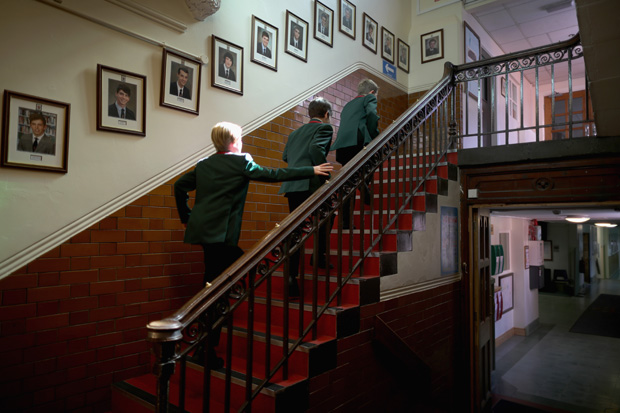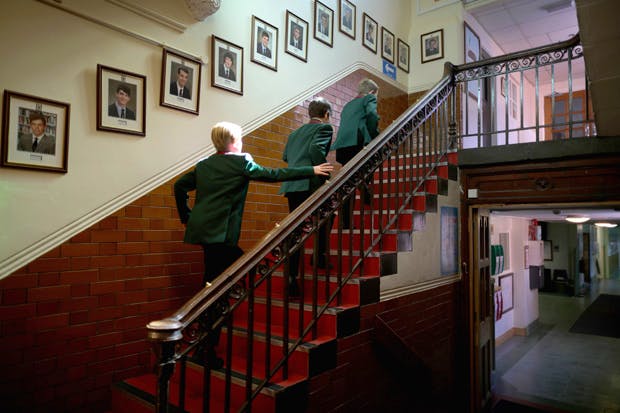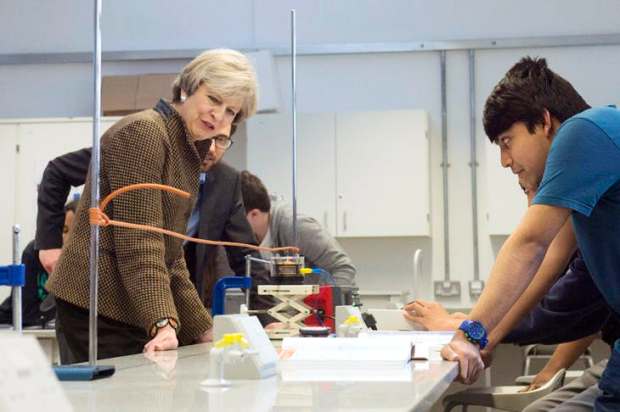By rights, I should be one of those Tories who is passionately in favour of grammar schools. After all, I went to one myself. My attachment to them should be particularly strong because before arriving at William Ellis in Highgate I went to two bog-standard comprehensives and failed all my O–levels apart from English Literature, in which I got a C. The only other qualification I left with was a grade one CSE in Drama. William Ellis was the making of me. Had I not got in, I doubt I would have ended up at Oxford.
Don’t misunderstand me. I’m not a passionate opponent of grammar schools either. I wouldn’t want to deny to other children the opportunities I had and would like my own children to have — a form of hypocrisy that’s widespread among critics of selective education. But I’m not so naive as to think that bringing back grammars would boost social mobility. Rather, they’d be more likely to impede it.
My own story is a case in point. At 16, after five years of comprehensive education, I was on a steeply downward trajectory. My father ran a sociological research institute in the East End and my mother was a novelist, yet after my abysmal O-level results the most I could hope for was skilled manual work. Consequently, I joined a residential workfare programme in South Devon and tried my hand at different trades. As a hedge, I retook three O-levels so I’d have just enough (the grade one CSE in drama was the equivalent of a C) to get into a sixth form if things went pear-shaped.
Needless to say, I was no better at site management and motor mechanics than I had been at physics and biology. Certainly not good enough to get a job in either field. A career as an unskilled labourer loomed and, if not for my place at William Ellis, I might now be a dustman or road sweeper. If we assume social mobility is a zero-sum game, my disappearance from the professional/managerial class would have created a vacancy for a bright working-class lad. He could have got my place at Oxford and carved out a career for himself in the media. But thanks to my second chance, that poor lad is doing a similar job to his father and his father before him, while my income and status is comparable to that of my parents. A good grammar school helped to preserve the English class system.
And my story is in no way exceptional. At their peak in the 1950s and 60s, when around a quarter of Britain’s schoolchildren in state-funded secondary education were at grammars, the main beneficiaries were the sons and daughters of the middle class and lower-middle class. According to the 1959 Crowther Report, around 36 per cent of the sixth-form pupils at grammar schools were classified as members of the ‘professional and managerial’ class, 18 per cent as ‘clerical’, 36 per cent ‘skilled manual’, 7 per cent ‘semi-skilled manual’ and 3 per cent as ‘unskilled manual’. Moreover, those in the last two categories were unlikely to go to university. Another report (Gurney-Dixon, published in 1954) revealed that two-thirds of the children of semi-skilled and unskilled manual workers at grammars left without two A-levels.
Today, grammar schools do even less to help the children of the least well-off. The Department for Education defines ‘disadvantaged pupils’ as those eligible for free school meals at some point in the last six years, a measure known as ‘FSM Ever 6’. In all of England’s state-funded secondary schools, 29 per cent of children are in this category; in England’s 163 remaining grammars, it’s les s than 5 per cent. On average, grammar schools admit four times as many children from fee-paying prep schools as children on free school meals.
If the government really is intent on creating new grammars, there are various things it could do to encourage them to admit more children from low-income families, but sharp-elbowed parents will always find a way to game the system. The main beneficiaries, as in my case, would be children of the middle class.
I’m not saying the policy would therefore be wrong. I’m sympathetic to the argument that if parents of bright children want them to be educated alongside other bright children, they should have that choice. It shouldn’t be an option confined to those who live near one of the remaining grammars or who can afford exorbitant private school fees.
But let’s not pretend bringing back grammars will boost social mobility.
The post The problem with grammar schools appeared first on The Spectator.
Got something to add? Join the discussion and comment below.
Get 10 issues for just $10
Subscribe to The Spectator Australia today for the next 10 magazine issues, plus full online access, for just $10.
You might disagree with half of it, but you’ll enjoy reading all of it. Try your first month for free, then just $2 a week for the remainder of your first year.













Comments
Don't miss out
Join the conversation with other Spectator Australia readers. Subscribe to leave a comment.
SUBSCRIBEAlready a subscriber? Log in